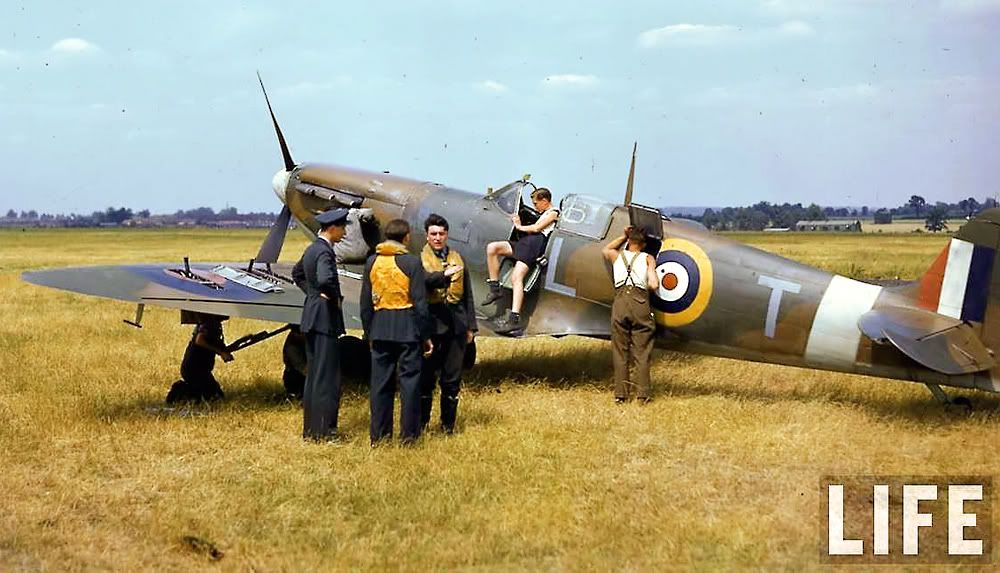Part 57. Sorry it’s late – RL intervened.
December, 1940
A SQUADRON LEADER DESCRIBES HIS SQUADRON'S BATTLE WITH THE ITALIANS
The commanding officer of 603 (City of Edinburgh) Auxiliary Fighter Squadron, who gives the following account of his most successful day, has fought with the squadron right from the beginning of the war. When the first raiders appeared over British soil in 1939, his squadron was the first to go into action and he himself was one of the first to open fire on enemy aircraft over this country, lie was a pilot officer then. Now he has been in command for several months—months during which the squadron has added over 100 victims to their previous score.
IN this particular battle I was largely in the position of a spectator, so I can tell you all about it. I was leading the squadron when my engine began to misfire and splutter. So I called up one of my flight-commanders and told him to lead while I broke away and tried to clear my engine. By diving and roaring the engine, I managed to make it run smoothly again and then took up position at the rear of the squadron.
We had taken off at about eleven-forty that morning. It was a sunny day with a slight ground haze which developed into mist from 18,000 feet up to about 26,000 feet. We were on a routine patrol with another squadron and after patrolling for forty or fifty minutes we were ordered to go here and there to investigate various raids which were reported over land and near the coast. While we were climbing through some cloud we lost touch with the other squadron.
We carried on alone and were on a southerly course approach¬ing Dover, when we were warned to look out for a formation of Italian aircraft. Every man was immediately on the alert. By this time I was at the back of the squadron and I heard the formation leader suddenly report aircraft dead ahead of us. At the same time someone else reported unidentified aircraft to the east, but the leader wisely held our course to fly towards the aircraft he had already seen. After a couple of minutes we saw the enemy aircraft flying south-west down the Channel. They were still some distance away and were 1,000 feet below us. They were Italian fighters—C.R. 42s—and were well over the sea flying at about 20,000 feet. When I first had a good look at them they gave me the impression of a party out on a quiet little jaunt. There were about twenty of them, flying along quite happily in good formation.
When the leader gave the order to attack and told us to sweep round and down on their tails, we were in a very advantageous position. Our machines must be about 100 m.p.h. faster than the Italian fighters and it was dead easy to overtake them and blaze away. They were flying in a sort of wide fan-like formation and when we went to attack each of our pilots selected his particular target. You can imagine how effective the first few dives were when I tell you that one of our pilots at one time saw six Italian fighters either on fire or spinning down towards the sea.
The Italians looked quite toy-like in their brightly-coloured camouflage and I remember thinking that it seemed almost a shame to shoot down such pretty machines. I must have been wrong, for the pilot who saw six going down at the same time said afterwards that it was a glorious sight. But I must say this about the Eye-Ties: they showed fight in a way the Germans have never done with our squadron. It is true, though that they seemed amateurish in their reactions. By that I mean they were slow to realise that we were anywhere near them until it was too late. Another thing, they kept their formation very well, but it didn't save them.
After a short while the Italians were dodging this way and that to escape our aircraft as best they could. One of them broke formation and turned towards France. I chased him and fired at him several times. I believe I hit him, too, and would have finished him off if my engine hadn't begun to splutter again when I was half-way across the Channel. So I left him to limp home while I turned towards the English coast to find the rest of the battle. It had vanished by this time, so I came home. The whole fight lasted only ten or fifteen minutes.

The long hot summer of 1940.